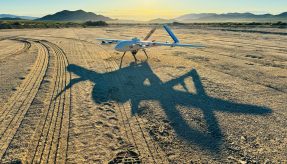
Dstl has taken part in a two-day workshop run by the Machine Speed Command and Control (MSC2) project on artificial intelligence (AI).
The innovative workshop was run by one of the MSC2 partners, Cambridge Consultants, with the aim of building a common understanding of the opportunities and challenges of AI.
Much of this shared understanding was explored through practical exercises, and commercial gaming technologies were used as a theme. They showcased the project’s novel AI approaches to Command and Control (C2) via gaming.
Participants built ‘banana classifiers’ as part of the workshop – a simple AI tool to classify the ripeness of bananas from photos.
This workshop was set up to not only raise collective understanding of AI as applied to the C2 domain, but to also examine commercial games like StarCraft II.
This is a commercial game which is used extensively for AI research by academia and industry. It has a programming interface available to support AI research and there’s also a strong esports community, which means that large amounts of human generated data and expertise exists.
StarCraft II made the news in 2019 when Deepmind’s AlphaStar AI was able to beat the majority of professional human players; a task significantly more challenging than previous game AI milestones, such as Chess or Go.
The MSC2 project is using StarCraft II to investigate the potential of gaming AI to support military C2-like problems.
Furthermore, the work around StarCraft II is being projected into a number of Dstl’s International Research Collaborations, looking at using AI to support C2 in a multinational context.
Dstl’s technical authority for MSC2, Dr Stephen Helsdon said: “The MSC2 project has been running for about 2 years now. This line of work has shown that we can relate AI in games like Starcraft II to military C2-like problems. These games allow us to investigate adversarial scenarios based on incomplete and uncertain information.
“Our AI enables the user to predict the location and type of red forces in real time based on incomplete data about the battlespace and shines a light through the fog of war. It empowers the user to understand the thinking of the AI by explaining how it produces its predictions and so the trust between the human and the AI is advanced to a higher level.
“Going forward, this gaming-centric research will continue with a focus on better explaining aspects of live human AI interaction. It will also look at inferring strategy based on observed behaviours. The workshop itself generated a number of interesting technical questions which we will follow up.”
If you would like to join our community and read more articles like this then please click here








